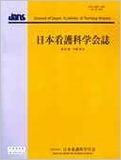Japanese
English
- 販売していません
- Abstract 文献概要
- 参考文献 Reference
- サイト内被引用 Cited by
要旨
目的:日本人の「終末期がん患者のスピリチュアルペイン」の概念を明らかにすることである.
方法:日本国内の文献を対象に,Rodgers & Knafl(2000)の概念分析方法を用いて分析した.
結果:7つの属性:【意味への問い】【死に対する不安】【尊厳の喪失】【罪責意識】【現実の自己への悲嘆】【関係性の喪失】【超越的存在への希求】,2つの先行要件,4つの帰結が抽出された.
結論:本概念は,「終末期がん患者が,生命の危機の恐怖や病気の進行による身体機能の衰えに伴い無力感を抱くことによって,生きること・存在すること・苦悩することの意味,死への不安,尊厳の喪失,罪責意識,現実の自己への悲嘆,関係性の喪失,超越的存在への希求等について問い続けざるを得ない苦痛」と定義された.これは,欧米のそれと多くは共通しており,人間の根源性に関わるものであった.日本人の特徴は,属性の【尊厳の喪失】と強く結びついていた排泄行動と,帰結における【複雑な様相性】を示す表現方法にあることが考えられた.
Objective: To clarify the Japanese concept of “the spiritual pain of terminal cancer patients.”
Method: A total 52 references published in Japan, including 40 theses and 12 books, were analyzed using Rodgers & Knafl's (2000) method of concept analysis.
Results: Seven attributes (namely “seeking meaning,” “anxiety about death,” “loss of dignity,” “consciousness of guilt,” “grief for real self,” “loss of relationship,” and “longing for transcendental existence”), two prerequisites and four consequences were extracted.
Conclusion: The Japanese concept of “the spiritual pain of terminal cancer patients” was defined as “terminal cancer patients' pain of an inevitable ongoing quest regarding the meaning of life, existence and suffering, anxiety about death, loss of dignity, consciousness of guilt, grief for real self, loss of relationship, longing for transcendental existence, etc., due to helplessness arising from fear of a life threatening condition and declining bodily functions caused by progression of the disease.” This concept was similar to that of the West and seems to be a universal concept among humans. Of these, excretion behavior (which is strongly associated with the attribute of “loss of dignity”) and the method of expression (which demonstrates the consequence of “complex modality”) were thought to be the characteristics exclusively associated with the Japanese.
Copyright © 2017, Japan Academy of Nursing Science. All rights reserved.


